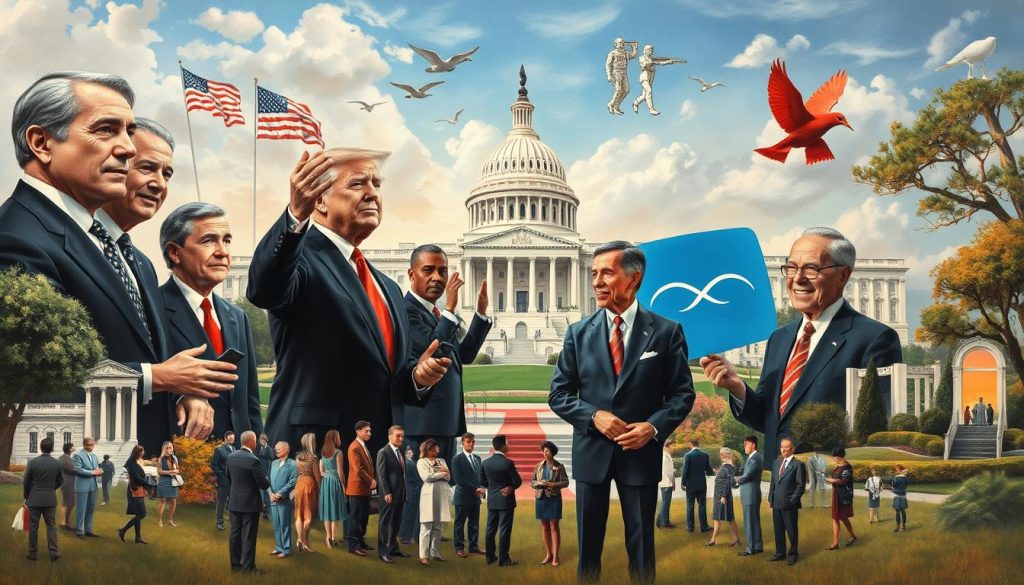Throughout history, America has faced many challenges and successes. Mental health is a key area where progress has been made. A few American presidents have led the way in mental health reform.
They have pushed for mental health advocacy and set presidential mental health policies. These efforts have greatly helped many people.
These reforms have changed lives for the better. They show how leadership can make a big difference. For example, the Clinton-Gore Administration worked hard to improve mental health care for everyone.
Key Takeaways
- Understanding the role of American presidents in shaping mental health reform.
- Recognizing the impact of presidential advocacy on the progression of mental health policies.
- Highlighting significant initiatives that address mental health treatment and prevent discrimination.
- Exploring the contributions of specific administrations, such as the Clinton-Gore, to mental health services.
- Emphasizing the importance of eradicating stigma and supporting those with mental health challenges through national efforts.
The Pioneers of Presidential Mental Health Advocacy
The journey to make mental illness less stigmatized in America has been helped by early presidents. Their efforts have paved the way for better mental health programs and laws. This section looks at the key early advocates among U.S. Presidents. It shows how their work has shaped policies and views on mental health care today.
Early Advocates and Their Contributions
In the early 20th century, talking about mental health was rare. But, some leaders saw its importance and its effect on society. Their early work was key in setting up the foundation for stronger mental health programs later on.
Influence on Future Mental Health Policies
As the country grew, so did its understanding and handling of mental health issues. The early push by presidents showed that mental health is vital to public health. This understanding helped lead to better mental health care, including more laws and community services.
| President | Contribution to Mental Health Advocacy | Impact on Future Policies |
|---|---|---|
| Theodore Roosevelt | Started talks on national mental health care | Helped shape early mental health laws |
| Franklin D. Roosevelt | Backed policies for better mental health care during the New Deal | Set the stage for post-war mental health programs |
This look back shows the progress made by past presidencies. It also points out the ongoing need for new policies that support mental health. The groundwork laid by these leaders is still important today. It continues to guide efforts to improve and expand mental health care in the U.S.
John F. Kennedy’s Launch of Community Mental Health Centers
In the 1960s, President John F. Kennedy made a big change in how America saw mental health. He started Community Mental Health Centers. This was because he cared deeply about mental illness, having seen it in his own family.
He wanted to give better care and make mental health a part of the community. This was a big step forward.

Legislation and Funding for Mental Health
In 1963, JFK signed the Community Mental Health Act. This act gave federal money for Community Mental Health Centers. It was a key part of his mental health plan.
The act was a big step toward moving mental health care out of hospitals and into the community. This change was a major part of his policy.
The Impact of Deinstitutionalization
Deinstitutionalization under JFK changed mental health care a lot. It moved away from long-term hospitals to community care. This was a more humane way to treat people.
JFK’s efforts made mental health care more about helping people get better. It was about treating them with respect and dignity. This set the stage for more changes in the future.
The start of Community Mental Health Centers changed mental health care forever. It still shapes policy and how people see mental health today.
Which Presidents Focused on Mental Health Issues
Many U.S. presidents have focused on presidents mental health issues. They launched presidential initiatives on mental health. This has shaped policy and raised mental health awareness nationwide.
Learning about these leaders shows us how mental health policies have grown. Here’s a timeline of key presidents and their efforts:
| President | Initiatives | Impact |
|---|---|---|
| John F. Kennedy | Community Mental Health Act | Laid the foundation for deinstitutionalization and community-based care. |
| Jimmy Carter | Presidential Commission on Mental Health | Enhanced federal focus and led to the Mental Health Systems Act of 1980. |
| Bill Clinton | Mental Health Parity Act | Addressed disparities between mental health care and other forms of medical care. |
| Barack Obama | Affordable Care Act | Expanded mental health and substance use disorder benefits and federal parity protections. |
These leaders left a lasting impact on mental health. Their work shows a strong commitment to mental health. It teaches us valuable lessons for today and tomorrow.
Lyndon B. Johnson and the Great Society’s Approach to Mental Health
Lyndon B. Johnson’s presidency was a turning point for mental health care in the U.S. His Great Society programs aimed to change social welfare policies, including mental health. The War on Poverty was key, focusing on the well-being of all Americans, including their mental health.

Mental Health Programs Under the War on Poverty
The War on Poverty was more than just economic help. It included programs to improve mental health services nationwide. These efforts helped low-income people get the mental health care they needed.
By funding community centers and training professionals, the War on Poverty made mental health care more accessible. This change helped communities get the help they needed closer to home.
Expansion of Medicare and Medicaid for Mental Health Services
Lyndon B. Johnson also expanded Medicare and Medicaid to include mental health services. This made mental health care a basic part of health coverage. It helped make mental health treatment more accepted and available.
This change was crucial for mental health care in America. It showed the importance of mental health in overall health care. Lyndon B. Johnson’s Great Society set the stage for today’s mental health policies.
Richard Nixon’s Contributions to Mental Health Services
Richard Nixon’s time in office was key for mental health policies in the U.S. He worked closely with mental health care, especially through better mental health legislation. This effort aimed to make mental health services better and move people from big institutions to community care.
Nixon made a big impact on mental health care by signing the Comprehensive Alcohol Abuse Act in 1970. This act helped update how the government handled mental health and substance abuse. It showed how important the early 1970s were for mental health policies.
In 1973, Nixon created the Special Action Office for Drug Abuse Prevention. This office showed Nixon’s dedication to linking mental health care with public health. It focused on fighting drug abuse, showing Nixon’s plan to tackle mental health through laws.
- Introduction of more humane community-based treatment solutions for mental health.
- Legislation that aimed to treat, prevent, and rehabilitate those affected by alcohol and substance abuse.
- Significant increases in federal funding for mental health research and treatment programs.
Nixon’s efforts greatly changed the face of mental health legislation. His focus on health issues in policy shows a crucial time of change. Nixon’s work aimed to break down old stigmas and barriers in mental health care.
JFK, Carter, and the Rehabilitation Act of 1973
The Rehabilitation Act of 1973 was a key law for disability rights in the U.S. It was shaped by leaders like President Jimmy Carter and President John F. Kennedy. They worked to help Americans with disabilities, improving mental health services too.

Securing Rights for Americans With Disabilities
The Rehabilitation Act of 1973 changed the game for disability rights. It made it illegal to discriminate against people with disabilities in federal programs. Jimmy Carter pushed for more rights and services for the disabled, making society more inclusive.
Legislative Actions Affecting Mental Health Services
The Rehabilitation Act of 1973 also improved mental health services. Carter’s efforts made mental health a part of public policy and healthcare. This showed how important good mental health care is for everyone, just like Kennedy wanted.
Presidential Initiatives on Mental Health by Ronald Reagan
Ronald Reagan made big changes in mental health care during his presidency. He aimed to fix the old systems and start new ones. These changes are still talked about today for their impact on mental health programs.
Reagan’s team made a big move with block grants under the Omnibus Budget Reconciliation Act of 1981. This change gave more power to states, making mental health care more flexible. Here are the main points of Reagan’s mental health strategy:
- Decentralization of Federal responsibilities: Moved control of mental health services from the federal to state level.
- Reduction in federal spending: Cut down federal money for mental health programs.
- Encouragement of private sector participation: Wanted more private companies to manage mental health services, hoping for better efficiency.
Reagan’s plan has gotten both praise and criticism. Some say it led to better, more specific mental health care. Others think it made services harder to get for those who need them most. Here’s a look at how funding changed during Reagan’s time:
| Year | Federal Funding ($ millions) | State Funding ($ millions) |
|---|---|---|
| 1981 | 210 | 190 |
| 1989 | 100 | 400 |
This shows a big change in where money came from for mental health care. It’s a key part of Reagan’s mental health plan. Today, people still talk about the right mix of federal and state control in mental health care.
Bill Clinton and the Mental Health Parity Act
The Mental Health Parity Act was passed in 1996. It was a big step forward for mental and physical health treatments. Then-President Bill Clinton led this effort, showing his commitment to health care.
Strides Toward Equal Coverage for Mental and Physical Health
The Mental Health Parity Act made sure mental health benefits were treated equally. It said that limits on mental health care couldn’t be lower than those for physical health. This change helped make health care more fair for everyone.
The Role of Advocacy in Passing Health Care Reform
Advocacy was key in getting the Mental Health Parity Act passed. Groups and policymakers pushed for change in how insurance treated mental health. Clinton’s team worked with these efforts to make mental health a big part of health care.

The success of the Mental Health Parity Act showed the impact of advocacy and good laws. It was a big win for Clinton and set the stage for future mental health reforms in America.
George W. Bush and the New Freedom Commission on Mental Health
George W. Bush created the New Freedom Commission on Mental Health. This was a big step towards better mental health awareness. It aimed to fix gaps and make mental health services more available.
The commission looked at the current mental health system. It suggested changes to help Americans fully join their communities. Bush’s effort through the New Freedom Commission made mental health a key focus. It paved the way for better policies and services.
Key objectives included:
- Decreasing the stigma associated with mental health treatment,
- Facilitating access to care for people with mental illnesses,
- Integrating mental health services across government agencies,
- Promoting successful community-based mental health treatment models.
The commission worked hard to improve mental health awareness nationwide. It aimed for care that covers all aspects of a person’s health. These steps were crucial for changing how society views mental health issues.
Barack Obama’s Efforts in Advancing Mental Health Awareness
During his presidency, Barack Obama made mental health a top priority. He knew millions of Americans lacked access to care. His plan had two main parts: making care more available and improving services for the military.
Improving Access to Care with the Affordable Care Act
The Affordable Care Act (ACA) was a big step forward in healthcare. It made sure mental health and substance use disorders were covered. This change helped make care more accessible and reduced stigma.
Addressing Mental Health in the Military
Obama’s team worked hard to help military mental health. They knew the unique challenges faced by those in the military and veterans. They aimed to catch mental health problems early and treat them fully.
The Obama administration also started the Mental Health First Aid program. It trained veterans, military members, and their families. They learned how to spot and help with mental illnesses and substance use disorders.
| Initiative | Description | Impact |
|---|---|---|
| Mental Health Parity and Addiction Equity Act | Extended parity protections to ensure that financial requirements and treatment limitations on mental health/substance use benefits were no more restrictive than those applied to medical/surgical benefits. | Increased access to mental health services for millions and reduced out-of-pocket costs for healthcare. |
| Joining Forces Initiative | Launched by Michelle Obama and Dr. Jill Biden, this initiative aimed to support veterans and military families, including enhancing access to mental health care. | Better educated health professionals about military culture and specific mental health challenges faced by military personnel and veterans. |
| Increased VA Funding | Significant increases in the Department of Veterans Affairs (VA) budget were allocated for direct mental health care. | Improved mental health care services for veterans, reduced wait times, and increased staffing and resources. |
The Obama administration’s efforts under the Affordable Care Act and for military mental health were crucial. They showed a strong commitment to improving mental health care for all. This marked a big step forward in how the country handles mental health issues.
Strides in Destigmatizing Mental Illness Across Presidencies
Many administrations have worked hard to improve mental health advocacy. They’ve taken big steps to make mental illness less stigmatized. This work includes public policies and starting a national conversation on mental health. It has changed how people see and support mental health issues.
Public Education Campaigns and Advocacy
Public education campaigns are key to raising awareness and reducing stigma. They help people talk openly about mental health. They also provide accurate info and support resources.
Mental health advocacy groups work with governments to reach more people. They use different media and events to spread their message.
Encouraging National Conversation on Mental Health
Presidential initiatives have made mental health a big part of national talks. This conversation is crucial for making new policies and getting community support. It shows how important mental health care is in our national health plans.
These efforts show a strong commitment to mental health at the top levels of government.
To learn more about top mental health services and advocacy, check out Northwestern Memorial Hospital. They are known for their innovative care and comprehensive mental health programs.
| Initiative | Description | Impact |
|---|---|---|
| Mental Health Awareness Campaigns | Programs designed to educate the public on mental health issues. | Increased awareness and reduced stigma. |
| National Mental Health Advocacy Groups | Collaborations with government to elevate the mental health discussion. | Enhanced public and political engagement. |
These ongoing efforts in mental health advocacy and destigmatizing mental illness are very important. They greatly improve the nation’s health and well-being. They lay a strong foundation for future progress in mental health care and policy.
The Evolving Landscape of Mental Health Funding and Support
The effort to boost mental health funding and support has changed with each new president. These changes show how policy, society’s views, and mental health’s place in public health have evolved.

Presidential mental health initiatives have greatly shaped mental health policy. Each president has either pushed for progress or caused setbacks in funding.
- Increased allocations for mental health research
- Expansion of public mental health services
- Enhancements in mental health coverage through insurance reforms
These efforts have made a strong case for the need for better mental health support systems.
| Presidential Term | Initiatives | Impact on Mental Health Funding |
|---|---|---|
| Previous Decades | Introduction of community-centered health services | Significant increase in localized funding |
| Recent Years | Legislation focusing on insurance parity and prevention programs | Broader insurance coverage, increased preventive funding |
These initiatives have done more than just increase funding. They’ve changed how we see, address, and fund mental health care at the federal level.
The Future of Mental Health Legislation in America
As we move forward in healthcare, the future of mental health care is uncertain. It’s shaped by new mental health legislation and presidential leadership. Understanding current trends and the president’s role is key to the future of mental health.
Current Trends and Potential Policies
The mental health scene in the U.S. is changing fast. New trends like digital health services and telepsychiatry are becoming more common. They show a future where tech plays a big part in mental health care.
There’s also a push to teach mental health in schools. This aims to catch problems early and prevent them.
The Role of Presidential Leadership in Shaping Mental Health Care
Presidential leadership is vital in shaping mental health policies. Good leadership can boost public awareness and support for mental health. It makes mental health a key part of public health.
History shows that active presidential support can lead to lasting mental health systems. These systems provide help and resources to many Americans.
In conclusion, the future of mental health legislation in America looks promising. Trends point to a more inclusive and tech-savvy approach. The impact of presidential leadership will likely lead to better policies, creating a strong mental health system.
Conclusion
In American history, the push for mental health reform has seen ups and downs. Presidential mental health advocacy has shown progress and setbacks. From John F. Kennedy’s community mental health centers to Barack Obama’s Affordable Care Act, there’s a deep commitment to mental health care.
But, the journey to strong mental health policies is tough. President Jimmy Carter’s commission showed that good intentions don’t always lead to change. The goal of a better system for those with severe mental illnesses is still far off, showing the need for ongoing effort and political will.
Presidents have a big role in mental health. They can help reduce stigma, get funding, and push for laws. Their efforts, though small steps, are important. They remind us that mental health is key to a nation’s well-being.
FAQ
Q: Which presidents have made significant contributions to mental health reform in America?
A: John F. Kennedy introduced the Community Mental Health Centers Act. Lyndon B. Johnson’s Great Society initiatives also helped. Richard Nixon increased support for mental health services. Jimmy Carter passed the Mental Health Systems Act.
Bill Clinton’s administration passed the Mental Health Parity Act. George W. Bush established the New Freedom Commission on Mental Health.
Q: What impact did the Community Mental Health Centers Act have?
A: John F. Kennedy’s Act aimed to move mental health care from big institutions to community centers. This led to more funding and the opening of many centers. It was a big step in changing how mental health care is delivered in the U.S.
Q: How was mental health policy influenced by the War on Poverty?
A: Lyndon B. Johnson’s War on Poverty included mental health care. It aimed to address poverty’s effects. This led to more facilities and services, especially for those who needed them most.
Q: What contributions did Richard Nixon make to mental health services?
A: Nixon’s administration passed key mental health laws. He also increased funding for mental health services. This showed a growing understanding of mental health needs.
Q: How did the Rehabilitation Act of 1973 affect mental health services?
A: Nixon signed the Rehabilitation Act of 1973. Jimmy Carter later expanded it. It protected the rights of people with disabilities, including mental illness. It was a big step in improving access to services.
Q: What initiatives on mental health did Ronald Reagan’s administration take?
A: Reagan’s administration cut federal funding for mental health. But it also kept block grants for states. It also started the Alzheimer’s Disease Initiative.
Q: What was the Mental Health Parity Act and who was responsible for it?
A: Bill Clinton signed the Mental Health Parity Act. It made insurance cover mental and physical health equally. It aimed to make mental health care more accessible.
Q: What did the New Freedom Commission on Mental Health do?
A: George W. Bush’s New Freedom Commission studied mental health care. It found gaps and recommended improvements. It focused on patient-centered care and national awareness.
Q: How did Barack Obama’s administration advance mental health awareness?
A: Obama’s administration expanded mental health coverage through the Affordable Care Act. It also improved services for veterans. Obama worked to start a national conversation on mental health.
Q: How have recent presidents worked to destigmatize mental illness?
A: Recent presidents have used their platforms to educate and discuss mental health. They’ve worked to change how people view mental illness. Their efforts have helped increase understanding and support.
Q: What trends in mental health legislation can we expect to see in the future?
A: Future mental health legislation may focus on integrating care and using digital services. There will be more community-based care and efforts for parity. Presidential leadership will continue to shape these changes.


















